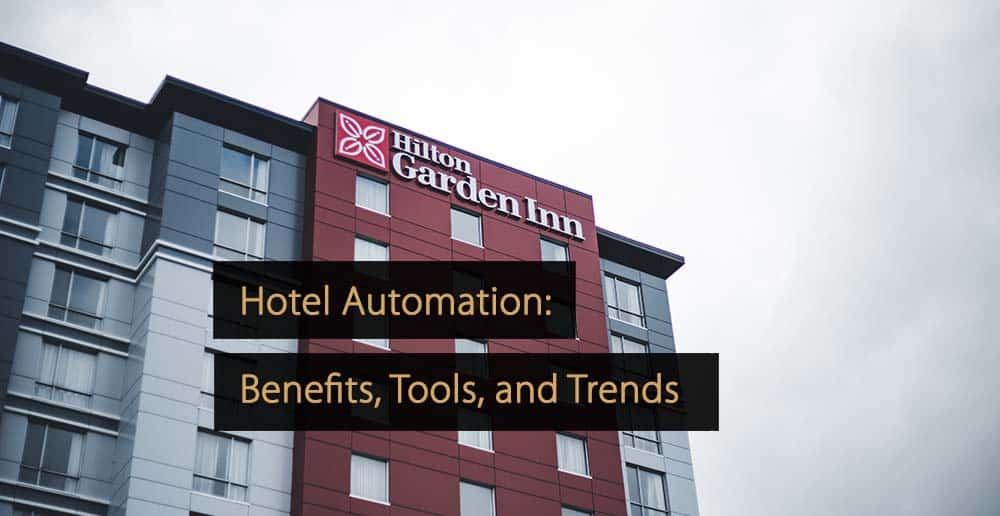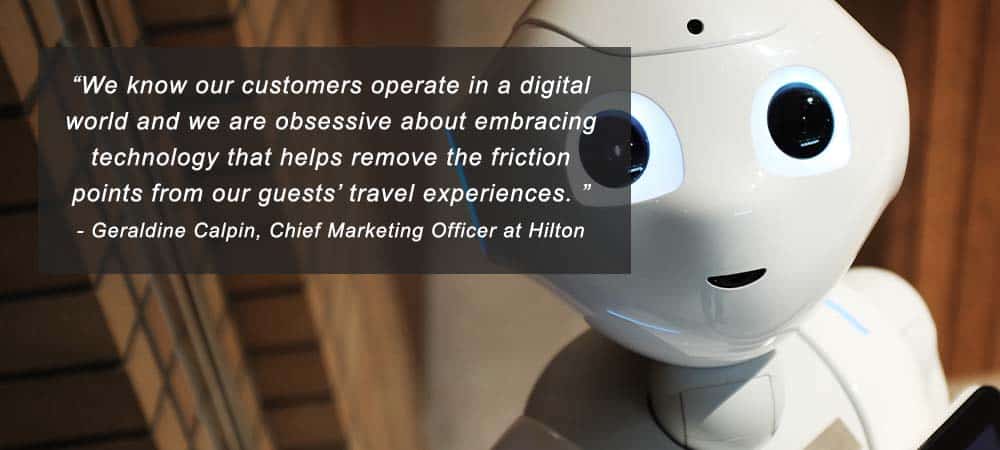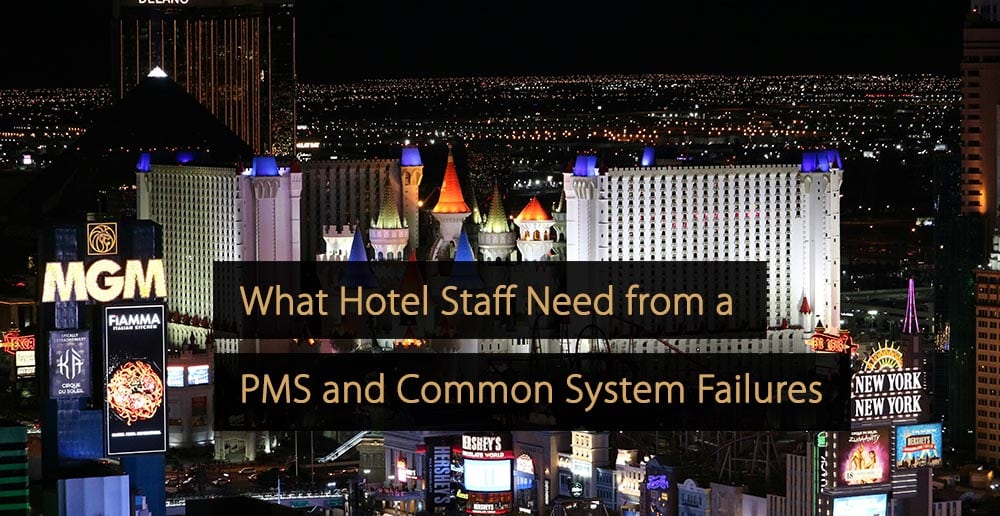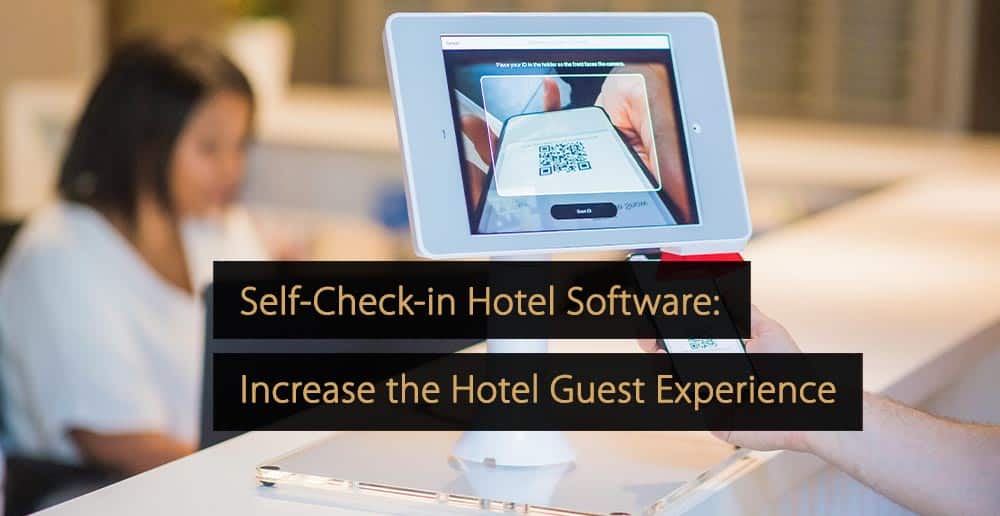You probably already use hotel automation to some degree. Most hotels use online booking, and most have adopted property management software. However, these are just the tip of the automation iceberg. In this article, you’ll discover a range of tools and trends in hotel automation and learn how they can benefit your hotel.
Table of Contents:
- What is Hotel Automation?
- Benefits of Hotel Automation
- What Can Be Automated in a Hotel?
- Hotel Automation Tools and Trends
- Will Automation Replace Guest Interaction?
- Robots in the Hospitality Industry
- Smart Room Implementation
- Mobile Hotel Check-in Apps
- Hotel Automation and Hotel Door Locks
What is Hotel Automation?
Like automation in other industries, hotel automation means using technology to perform manual operations more efficiently. In a hotel, this frees staff from mundane and repetitive tasks so they can focus on more complex work. Automation can reduce costs, make your hotel operations more efficient, and improve guest satisfaction by speeding up processes and reducing wait times. When it comes to digital trends, hotel businesses are in the vanguard. Technologies like check-in kiosks, digital concierges, AI chatbots, and smart hotel rooms can make a guest’s stay much smoother and more enjoyable, providing services that would otherwise need to be undertaken by a staff member.
Benefits of Hotel Automation
In this section, you’ll learn about how hotel automation can improve efficiency and enhance the guest experience.
Ease Communication Between Hotel Departments
Staff from one department frequently need information from other departments. For instance, front-of-house staff will often need to communicate with reservations, or housekeeping staff will need to contact the maintenance department. This can lead to delays and miscommunication, often resulting in an unsatisfied guest or an escalating problem. Hotel automation can streamline communication, improving response times and preventing minor issues from becoming more serious. This makes your guests happier and avoids negative reviews.
Take Control
Automation tools can be integrated into your property management system (PMS), giving you a single location where you can address issues and handle day-to-day operations. Integrated hotel automation puts you in the driving seat, allowing full control over all your hotel operations. It also gives guests more control over their stay, allowing them to fulfill their needs and requirements without waiting for the staff or getting through to a busy front desk. You can put the guest experience front and center.
Omnichannel Service
Different people prefer to communicate through different channels. One guest might prefer to talk on the phone, another via email. Some guests might be happier using social media messaging or the messenger system built into your hotel app or website. With omnichannel technology, nobody is left waiting for a response. Integrating all your channels on a single platform lets you handle every guest’s message, no matter their chosen channel. This shortens your response times.
Cost Reduction
A major benefit of automation is reduced costs. Chatbots, for example, can save money by removing the need for human operators and the infrastructure to support them. This can be especially important in the hotel industry, where customers may be in different time zones and speak many languages. Recruiting multilingual operators can be difficult and costly. Chatbots are available continuously, day or night, meaning that customers can always get a response regardless of their time zone.
Elevate Customer Service and Guest Communication
Another benefit of automation is making communication easier so that guests’ queries and comments can be dealt with more rapidly. Staff often find themselves wasting time with repetitive queries, repeatedly answering the same questions. An AI chatbot is ideal here, as it can handle common questions swiftly and courteously. Chatbots can also be trained on large amounts of data, meaning they can answer a wider range of queries without passing the query to a staff member.
What Can Be Automated in a Hotel?
Many elements of hotel operations can be automated, including check-in, lead generation, satisfaction surveys, loyalty processes, and more. Here are some examples.
Reception
Digitizing your hotel’s check-in process makes life easier for guests, who can simply check in from their preferred device.
Guest Experience
Customer assistance, satisfaction surveys, cross-selling, reservations for hotel services, and external services can all be automated.
Housekeeping
Hotel automation can streamline guests’ housekeeping requests, making it easy for them to make requests that are passed on to the team.
Food and Beverage
Guests can order room service or restaurant meals through the hotel app, while kitchen operations and inventory management can be streamlined.
Events and Meeting Rooms
Automated systems can handle tasks like registration and access, as well as capacity control, scheduling, and data capture.
Common Areas
Hotel automation can assist in access management and monitoring of common areas, as well as tasks like ensuring Wi-Fi connectivity.
Hotel Automation Tools and Trends
In this section, you’ll discover some top trends and tools in hotel automation.
Robotic Concierge
One of the newest hospitality trends, robot concierges, are technologies that reduce the need for human staff by providing guests with an AI-powered concierge. Often, this is simply an app that can be accessed via the hotel’s technology or a guest’s device. Some hotels have taken the concept more literally: The Hilton has introduced a friendly robot called Connie, who can greet guests, answer questions, and take requests. Another example of a literal robotic concierge is the doll-like robot who assists guests at the Henn-na Hotel in Tokyo. These robots advise guests on local attractions or tell them about room amenities.
Video: Meet Connie, the Hilton robot concierge
Automated Check-in Process
Automating the check-in process can be a boon for weary guests. Guests can use these systems to check in quickly and efficiently instead of being greeted with a long line and a tedious wait. Increasingly, hotels can use biometric data to allow guests to check in and access their accommodation immediately, with no waiting and no need to struggle with communication in a language they might not speak well. Hotels have many options for automated check-in, from apps and other software solutions to check-in kiosks. Automating check-in also makes life easier for your staff, who will need to handle fewer customers.
Online Booking Engines
An online booking engine is one of the most important examples of hotel automation. Adding one to your hotel website will dramatically increase conversion rates by making it easier for guests to book as soon as they find you online. While you should certainly maintain a presence on OTA platforms like Booking.com or Hotels.com, implementing your booking engine means that you aren’t reliant on these websites and have more control over the guest experience right from the moment they book. You’ll also avoid the commissions that OTAs charge, which can be significant.
Automated Room Service and Housekeeping
While robots can’t make the beds at your hotel — at least not yet — they can accomplish many other tasks. Modern robotics is certainly advanced enough to allow for automated room service: guests place their orders via the hotel app or smart room technology, and the instructions are relayed to a robot that then navigates to their room with a food order or other items that the guest requires. Robots can also perform housekeeping tasks, such as cleaning or vacuuming floors. They may also be able to detect cleaning or maintenance issues that should be escalated to the proper department.
Video: JW Marriot Sahar – Smart Hotel Room – Hotel Automation
Voice Control Systems and Room Automation
Voice control systems are increasingly popular in hotels. Guests can adjust the light levels or the temperature with a simple command. They can also turn on the entertainment systems, request music or films, set wake-up calls, and more. Voice control systems can also allow guests to communicate with an automated assistant, providing them with immediate access to information and responses to questions. Examples of voice control technology include Alexa for Hospitality and similar products. This kind of technology is revolutionizing the guest experience. It can also be integrated with other systems, such as your property management system.
Smart Locks
Smart locks are computerized locks that can be opened with key cards, PIN codes, or a guest’s mobile device. Some even use biometric data like fingerprint scans or facial recognition. There are a range of advantages to installing smart locks, both in terms of convenience and security. One major advantage to smart locks is that they can be integrated into your hotel’s PMS and automated check-in systems: Guests can check-in, receive a PIN or scannable QR code, and immediately be able to gain access to their rooms with no queueing or waiting for a staff member.
Hotel Property Management Systems (PMS)
Hotel PMS technology has already been mentioned a few times in this article. That’s because it’s an increasingly valuable type of hotel automation. Your hotel almost certainly uses a PMS: a software solution designed to manage every aspect of your hotel’s operations, from financial transactions to the guest experience. In the past, a PMS was a relatively limited software package. It would handle bookings, registration, and room availability but little else. Modern PMS technology is much more advanced and feature-rich. A hotel PMS system can now automate all kinds of hotel operations, from inventory management to ordering from vendors and processing guest requests.
Will Automation Replace Guest Interaction?
While many hotel operations can be automated, many can’t. Hotel managers need to balance greater efficiency and the human touch that’s so important for a great guest experience. Automating mundane, repetitive operations can significantly improve the guest experience by freeing up skilled staff for more complex tasks that require in-person interactions. Indeed, an automated system cannot provide the genuine hospitality required to create a welcoming atmosphere.
For many interactions, such as a simple query or making a room service request, efficiency and ease of access are probably more important to the average guest. It should also be remembered that some tasks simply can’t be automated, as they’re too complex or require human experience. A hotel chatbot might be able to list local restaurants, but it can’t tell a guest who has the tastiest food.
Robots in the Hospitality Industry
If this article on hotel automation has intrigued you, you might want to learn more about how robots are used in the hospitality industry. From AI chatbot concierge services to hotels with robots working at the front desk, many examples of robots filling roles in the hospitality industry exist.
In “8 Examples of Robots Being Used in the Hospitality Industry,” you’ll meet some of the high-tech androids and AIs who are making hospitality more enjoyable and efficient for guests around the world, from the robots working airport security to Henn-na Hotel’s friendly dinosaur check-in staff.
Smart Room Implementation
After reading about smart rooms in this article, you might be excited to know more. What exactly are smart rooms, and how can they improve your guests’ stay? More importantly, how can a hotel implement smart room technology in its existing infrastructure? Smart hotel rooms are one of the top hotel digital trends today. They’re attractive to customers and enhance the guest experience in various ways.
If you’re thinking of adding smart technology to your hotel rooms and want to know more, read “7 Ways to Transform a Hotel Room Into a Smart Room” today.
Mobile Hotel Check-in Apps
You’ve already seen how mobile hotel check-in apps can make life much easier for your guests and take the pressure off your busy front-desk staff. If you want to learn more about mobile check-in apps and how they can transform the guest experience at your hotel, read “Mobile Check-In App for Hotels: What Are The Benefits?” In this article, you’ll discover how mobile check-in apps work, what they do, and how they can streamline hotel operations and make the check-in process more convenient for your guests.
Hotel Automation and Hotel Door Locks
An aspect of hotel automation that is sometimes overlooked is your hotel door locks and locking systems. Many modern systems can include a strong automation component, where keycards automatically expire when the guest checks out, or automatically become inactive if reported as being lost or stolen.
In the article “Hotel Door Locks: The Main Lock System Types and Their Benefits“, you can learn all about the different hotel door lock systems that exist, what their benefits are, and how to choose the right locks for your property.
Hotel Automation FAQs
Hotel automation is here to stay, and it’s always becoming more sophisticated. You can use automation to streamline day-to-day hotel operations, cut costs, reduce the pressure on staff, and make your guests’ stay more enjoyable.
More Tips to Grow Your Business
Revfine.com is the leading knowledge platform for the hospitality and travel industry. Professionals use our insights, strategies, and actionable tips to get inspired, optimize revenue, innovate processes, and improve customer experience.Explore expert advice on management, marketing, revenue management, operations, software, and technology in our dedicated Hotel, Hospitality, and Travel & Tourism categories.
This article is written by:
Hi, I am Martijn Barten, founder of Revfine.com. With 20 years of experience in the hospitality industry, I specialize in optimizing revenue by combining revenue management with marketing strategies. I have successfully developed, implemented, and managed revenue management and marketing strategies for individual properties and multi-property portfolios.










Leave A Comment